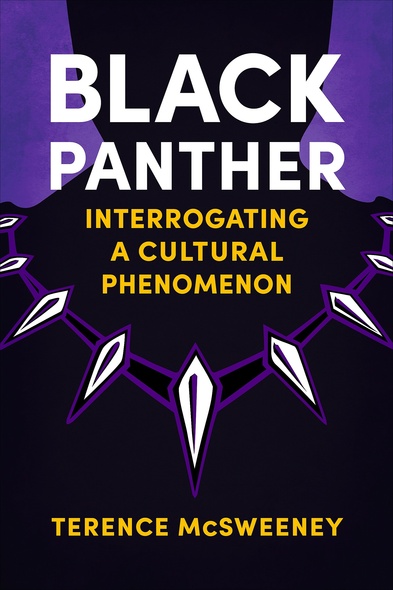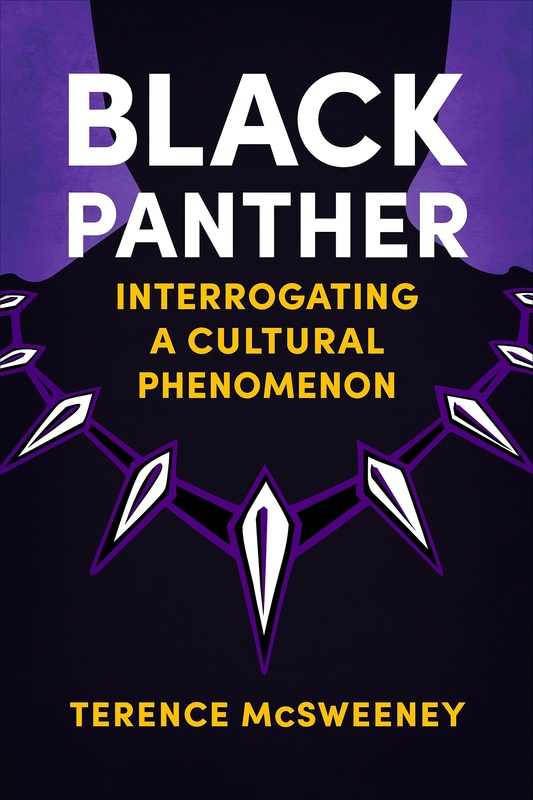Our shopping cart is currently down. To place an order, please contact our distributor, UTP Distribution, directly at utpbooks@utpress.utoronto.ca.

Black Panther
Interrogating a Cultural Phenomenon
Named a Nonfiction Book Awards Gold Winner by the Nonfiction Authors Association
Gold Winner of the 2022 eLit Book Award for Popular Culture
Winner of a National Indie Excellence Award in the category of “Movies & TV”
Book of the Year 2021 in African Studies awarded by CESTAF
Winner of the 2022 Best Book Award in the category of “Performing Arts”
Black Panther is one of the most financially successful and culturally impactful films to emerge from the American film industry in recent years. When it was released in 2018 it broke numerous records and resonated with audiences all around the world in ways that transcended the dimensions of the superhero film. In Black Panther: Interrogating a Cultural Phenomenon, author Terence McSweeney explores the film from a diverse range of perspectives, seeing it as not only a comic book adaptation and a superhero film, but also a dynamic contribution to the discourse of both African and African American studies.
McSweeney argues that Black Panther is one of the defining American films of the last decade and the most remarkable title in the Marvel Cinematic Universe (2008–). The MCU has become the largest film franchise in the history of the medium and has even shaped the contours of the contemporary blockbuster, but the narratives within it have almost exclusively perpetuated largely unambiguous fantasies of American heroism and exceptionalism. In contrast, Black Panther complicates this by engaging in an entirely different mythos in its portrayal of an African nation—never colonized by Europe—as the most powerful and technologically advanced in the world. McSweeney charts how and why Black Panther became a cultural phenomenon and also a battleground on which a war of meaning was waged at a very particular time in American history.
McSweeney’s book is an important contribution to African American studies and to film studies generally, teaching readers about the powers and limits of blockbuster cinema. Highly recommended.
In analyzing the ‘why’ and ‘how’ behind Black Panther’s cultural phenomenon, along with the implications of these findings, McSweeney’s work serves as a thoughtful, multimodal reflection on the important questions of the film.
The exploration of those opposing views and varying intensities of popular reception makes McSweeney’s very readable study particularly useful for film and popular culture scholars.
This study signals a careful consideration of a significant cultural moment and happily delivers from the opening pages. For fans of Marvel’s Black Panther, this book provides a detailed review of the volumes written about the film. Those concerned with the cultural meaning of that groundbreaking movie will find an insightful consideration of how and why it has engaged audiences worldwide. While we are quick to dismiss superhero blockbusters, McSweeney provides a framework to understand how this film transcends expectations by engaging with more profound arguments represented by Black Panther. If you are looking for a clear picture of why Black Panther was and continues to be so central to popular imagination, this book is for you.
Terence McSweeney provides new insights into Black Panther, but just as significantly, his analysis of the cultural moment when the film was released illuminates larger societal issues. Contextualizing the response to Black Panther yields insights into the film itself but also the influences on its creators and the reception from its audience. By successfully exploring these issues, McSweeney highlights why Black Panther was not only a popular film but an important one too.
The motion picture Black Panther united audiences worldwide in celebrating an African superhero. Black Panther: Interrogating a Cultural Phenomenon dives into an exploration of alternate history and its real-world impact, including how and why the character and film spoke to so many people from all walks of life. The book shines a light on how issues, conflicts, and needs in our world are reflected both overtly and allegorically in this story. It is an important book and makes for a fascinating read.
Pleasingly encyclopedic in its details and sensitive to the complexities of this nuanced, multi-layered film, Terence McSweeney’s Black Panther: Interrogating a Cultural Phenomenon is not just a valuable exploration of a single movie, but a convincing case study about the role that superhero cinema plays in our broader cultural and political discourse.
Terence McSweeney issenior lecturer in film and television studies at Solent University. He is author of The "War on Terror" and American Film: 9/11 Frames Per Second;Avengers Assemble! Critical Perspectives on the Marvel Cinematic Universe;and The Contemporary Superhero Film: Projections of Power and Identity. He was named Author of the Year 2021 in African Studies by the Centre for African Studies of Babeş-Bolyai University Cluj-Napoca for his book, Black Panther: Interrogating a Cultural Phenomenon, published by University Press of Mississippi.





